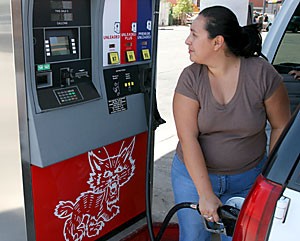As gas prices nationwide rise above $3 per gallon, UA students and departments around campus are feeling the crunch.
“”I moved back in with my Mom so I could afford a car, but now that I have a car I can’t afford much else,”” said Amanda Estrada, a business-marketing senior who commutes to campus from Marana. “”I thought I would have extra money in my budget by getting rid of the cost of rent and utilities, but because of gas I think I have less extra money.””
Estrada, like many UA students, commutes to campus four to five times a week.
“”No matter how high gas prices end up going people still need to get to wherever they need to go,”” Estrada said.
With her gas costs reaching nearly $200 a month, Estrada said she would love an alternative transportation method such as carpooling, but there are no options available to her.
“”I live in Marana and I know only one other person from the U of A, but they already graduated,”” Estrada said.
Chris Bahe, a political science freshman, said the worst part of high gas prices is the negative effect they have on his ability to visit his family.
“”My family lives five hours away in Window Rock, and because of gas prices I don’t get to go home and visit them as much as I’d like,”” Bahe said. “”I want to go home – I’m a family oriented person – but I can’t afford it.””
Despite living on campus, high gas prices have forced a cutback on extra spending, Bahe said.
“”I spend more money on food and groceries so I don’t have to drive around as much,”” Bahe said. “”I don’t spend as much money on non-necessities like clothes and junk food.””
Trying to prevent driving as much as possible and riding with friends are two techniques Michelle Paxson, a senior majoring in family studies and human development, uses to save money on gas.
“”I try to get a ride to campus so I don’t have to spend the money on gas and there aren’t many parking options,”” Paxson said.
Riding the bus is impractical because it doesn’t save people that much money, and there are always creepy people on the bus, Paxson said.
“”The people on the bus are cracked out or something. They’re always staring at you and trying to get up in your business,”” Paxson said.
Students and the UA should invest in hybrid (electric and gas) vehicles, Paxson said.
“”Hybrid cars would not only save the university some money on gas, but it would benefit them in the long run,”” Paxson said.
The CatTran should also expand its route further south and east to encourage students who live close to campus to use the buses rather than drive, Paxson said.
But students aren’t the only ones feeling the effects of the rising gas prices; departments like Parking and Transportation Services have seen their costs rise dramatically.
“”We haven’t finalized our budget numbers in total yet, but we’ve seen an increase of about $100,000 since last July,”” said Patrick Kass, director of parking and transportation services.
Since January, Parking and Transportation Services has been evaluating what areas could be cut if the need arises, Kass said.
“”It’s tough because despite costs rising we want to keep our service at the high level it is at now,”” Kass said. “”The worst case scenario is we would have to start cutting our service down, and that’s always our last resort because CatTran is a vital link to getting people around campus.””
The CatTran transports about 500,000 people during a fiscal year, and a cutback in service would affect the entire UA community, Kass said.
“”We are an auxiliary, so we get less than $30,000 a year from the university; the rest of our funding is made up from parking permits and parking fines,”” Kass said. “”Increased costs could eventually result in increased prices for parking permits and violations.””
Higher gas prices could not only increase the price of parking permits but also the price of tuition and other student costs, said Marshall Vest, the director the Eller College of Management’s economic and business research center.
“”The cost of everything rises as gas prices increase,”” Vest said. “”Increased costs have to be covered somehow, and you either get money from the legislature, which has been harder and harder to get over the years, or you get it from students, which means tuition increases.””
High gas prices can also have an effect on which universities students choose to attend, Vest said.
“”Because of high gas prices, the prices of airline tickets are going up, which is absolutely necessary if the airline industry is going to remain whole,”” Vest said. “”As fares go higher more students are going to stay home.””
Vest said, however, that gas prices will continue to fluctuate.
“”Gas prices just a couple of years ago were below a dollar and here in recent weeks you’ve seen gasoline as high as three dollars,”” Vest said. “”But we had gas prices at three bucks after Hurricane Katrina and it didn’t hurt much then, so why should we worry now?””









